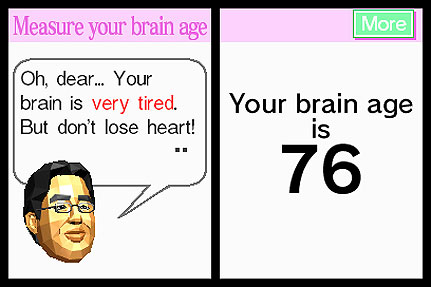William Reichman: Assessing Cognitive Fitness
Gary Wolf
March 19, 2009
 I recently saw Alvaro Fernandez of sharpbrains.com speak at eTech 2009, the O’Reilly emerging technology conference. Fernandez is a Stanford MBA working as a market researcher focused on the “brain fitness” industry. Not surprisingly, he posts quite a bit about commercial opportunities, and publishes a newsletter with surveys, estimates, and forecasts about the state of the market, as well as pitches and concepts from academic and industry folks.
I recently saw Alvaro Fernandez of sharpbrains.com speak at eTech 2009, the O’Reilly emerging technology conference. Fernandez is a Stanford MBA working as a market researcher focused on the “brain fitness” industry. Not surprisingly, he posts quite a bit about commercial opportunities, and publishes a newsletter with surveys, estimates, and forecasts about the state of the market, as well as pitches and concepts from academic and industry folks.
In his February newsletter, Fernandez interviews Dr. William Reichman, formerly the President of the American Association for Geriatric Psychiatry and now the President and CEO of the Center for Brain Fitness at Baycrest. Baycrest is an academic-commercial partnership funded by the Ontario government that aims to develop research tools and commercial spin-offs in the brain fitness field. The most interesting part of the interview, for self-trackers, will be Reichman’s conclusion that the major thing standing in the way of a legitimate brain fitness industry is the lack of quality self-assessment tools. See the excerpts below, where he dreams of a cognitive assessment tool as easy to use as a blood pressure cuff. (Related posts: Tim Lundeen has given us a look at his self-assessment procedure for brain fitness, and Seth Roberts is experimenting with this as well..)
Seth and I were discussing brain fitness software via email, and he raised the point that these “fitness” tools might actually work better for assessment than for training. While is very popular right now to assert that the brain is “like a muscle” in the sense of being improved through training, it is obvious that cognitive decline due to aging is influenced mostly by factors other than training. We are going to want to be doing a wide variety of experiments to see what will work to slow cognitive decline, or, to cast a rosier light on it, to “optimize cognition.” None of these experiments will have meaning without reliable assessment tools – and the simpler the better!
Excerpt from the Sharp Brains newsletter, February 27, 2009: Does Cognitive Fitness Work?
Dr. William Reichman: Quality and widely available assessments are a critical part of the
puzzle. Consumers and professionals need easy-to-use, low cost,
assessments to measure both their needs and the impact of different
interventions. Baycrest is going to take a leadership role in this
area–we believe that the development of a tool equivalent to the blood
pressure cuff will have great impact on brain health in the areas of
prevention and treatment.
Alvaro Fernandez: []… what is the main obstacle you see today for
the development of a sustainable brain fitness market that can fulfill
its promise?
Dr. William Rechman: I’d say the lack of widely accepted standards for outcome measures.
There are myriad ways to measure the impact of cognitive exercise and
other lifestyle options – we can talk psychometrics, assessments of
daily living, neuroimaging findings. But, there is not a consensus yet
on what to measure and how. Dr. Gary Small and I were talking recently
about the need to step up in this area, figuring out how to engage a
variety of serious stakeholders in solving this important issue.


